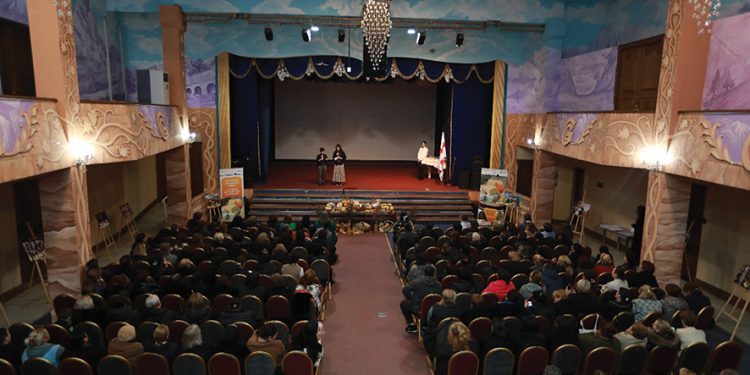The Food and Agriculture Organization of the United Nations (FAO) recently celebrated the successful completion of a four-year project in the Samegrelo-Zemo Svaneti region, aimed at empowering women dairy farmers. The initiative, funded by the Swiss Agency for Development and Cooperation (SDC) and implemented in partnership with UN Women, has made significant strides in enhancing the region’s dairy production.
The event brought together local women farmers who have been actively involved in FAO’s Farmer Field Schools. Representatives from SDC and UN Women, as well as project stakeholders from the Rural Development Agency, National Food Agency, Zugdidi City Hall, and local civil society, were also present to mark the occasion.
Throughout the project, FAO established 30 Farmer Field Schools across eight municipalities in the Samegrelo-Upper Svaneti region. Over 600 women dairy farmers received training in best practices for dairy production, including hygiene, animal health, nutrition, and Georgian food safety regulations. They also gained insights into cattle registration and identification, gender equality, women’s rights, and business and leadership skills. These trainings have empowered farmers to engage in community activism, leading to tangible results that have positively impacted their communities.

In addition to knowledge-sharing, participants received equipment and tools for milk and dairy production, enabling them to produce higher-quality products more efficiently. As part of the training, farmers learned how to make a variety of cheeses, including Caciotta and Halumi. Many of them began producing these cheeses for their households and even for commercial purposes. FAO also provided support in marketing, labeling, and branding their artisanal dairy products.
A key aspect of the project was fostering collaboration between the women farmers and the HoReCa (Hotels, Restaurants, and Cafes) sector through tastings and exhibitions. Several farmers have successfully partnered with local shops, restaurants, and hotels to supply high-value cheese varieties.
Javier Sanz Alvarez, FAO Programme Coordinator, praised the project’s success, stating: “Cheese is vital to Georgian culture and is traditionally made by women who pass their knowledge from generation to generation. However, these women often lack access to modern cheesemaking techniques and financing. Through training, we taught these women simple practices to improve production quality, hygiene, and food safety, as well as how to make different types of cheese with a longer shelf life. As a result, many farmers produced more milk and cheese, leading to increased incomes. I’m proud of these strong Georgian women, and I believe this is just the beginning of their continued success.”
Empowering women is crucial for resilient families and thriving communities, notes Barbara Böni, Regional Director of Cooperation at the Embassy of Switzerland in Georgia, adding: “We’re proud to support this initiative, which not only enhances practical skills but also fosters women’s leadership and economic empowerment. By partnering with organizations like FAO and UN Women, as well as local communities and the private sector, we’re driving transformative change in Georgia.”

Kaori Ishikawa, UN Women’s Country Representative for Georgia and Liaison for South Caucasus, highlighted the project’s impact on rural women: “At UN Women, we are committed to creating opportunities for women in rural areas, helping them boost their incomes and enhance their communities’ quality of life. This project has empowered many women, increasing their self-confidence and economic standing while also improving access to social services and healthcare. I thank SDC for their support, FAO for the partnership, and the women who are taking initiative to improve their businesses and engage in decision-making processes.”
This project has provided women in Samegrelo-Zemo Svaneti with the tools and knowledge to not only enhance their livelihoods but also contribute to the economic and social development of their communities.
By the FAO Team














